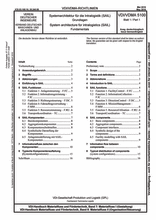Standards Worldwide
Standards Worldwide
Phone +49 30 58885700-07

Technical rule [CURRENT]
VDI/VDMA 5100 Blatt 1:2016-05
System architecture for intralogistics (SAIL) - Fundamentals
- German title
- Systemarchitektur für die Intralogistik (SAIL) - Grundlagen
- Publication date
- 2016-05
- Original language
- German, English
- Pages
- 16
- Publication date
- 2016-05
- Original language
- German, English
- Pages
- 16
Product information on this site:
Quick delivery via download or delivery service
Buy securely with a credit card or pay upon receipt of invoice
All transactions are encrypted
Short description
This Standard describes a system architecture for intralogistics (SAIL). SAIL is a methodology, which describes the system levels for intralogistical systems, as well as their built-in functions and interfaces. The resulting SAIL model is completely platform independent. Contrary to the traditional top-down dismantling in plant levels, a paradigm shift, inspired by object-oriented programming, leads to the SAIL model. The procedure steps cover the primary plant dismantling according to functions and not to levels, the packaging of the found functions in components, the standardisation of the interfaces of the components and the supply of control components similar to available mechanism components. Summarised, SAIL offers a clear cost advantage with a high re-usability degree of the totally enclosed functions in all phases by reducing adaptation expenditure, higher standardisation, riper test degree and shorter start-up in industries.
Content
ICS
03.100.10,
35.240.50
Also available in
Loading recommended items...
Loading recommended items...
Loading recommended items...
